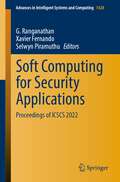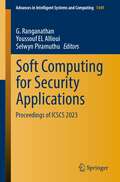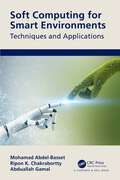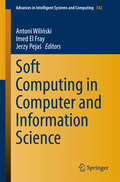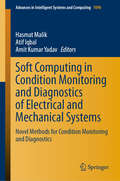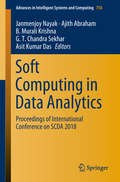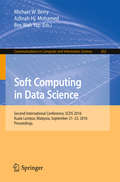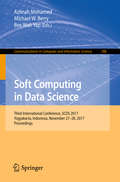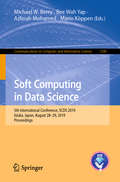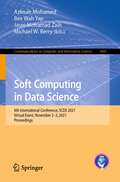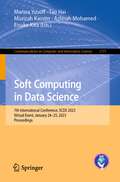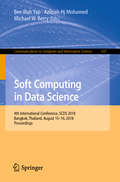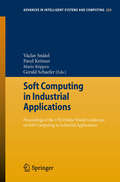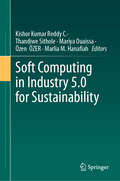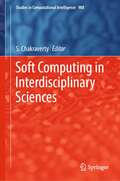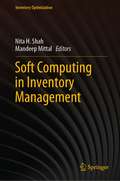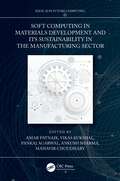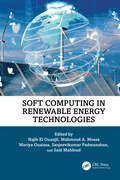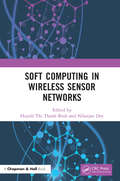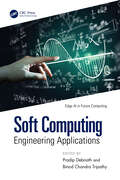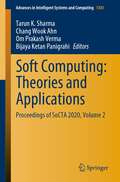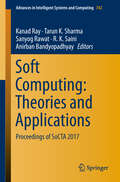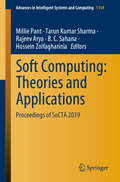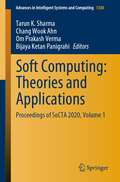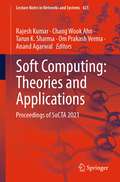- Table View
- List View
Soft Computing for Security Applications: Proceedings of ICSCS 2022 (Advances in Intelligent Systems and Computing #1428)
by Selwyn Piramuthu Xavier Fernando G. RanganathanThis book features selected papers from the International Conference on Soft Computing for Security Applications (ICSCS 2022), held at Dhirajlal Gandhi College of Technology, Tamil Nadu, India, during April 21–22, 2022. It covers recent advances in the field of soft computing techniques such as fuzzy logic, neural network, support vector machines, evolutionary computation, machine learning and probabilistic reasoning to solve various real-time challenges. This book presents innovative work by leading academics, researchers, and experts from industry.
Soft Computing for Security Applications: Proceedings of ICSCS 2023 (Advances in Intelligent Systems and Computing #1449)
by Selwyn Piramuthu G. Ranganathan Youssouf El AlliouiThis book features selected papers from the International Conference on Soft Computing for Security Applications (ICSCS 2023), held at Dhirajlal Gandhi College of Technology, Tamil Nadu, India, during April 21–22, 2023. It covers recent advances in the field of soft computing techniques such as fuzzy logic, neural network, support vector machines, evolutionary computation, machine learning, and probabilistic reasoning to solve various real-time challenges. The book presents innovative work by leading academics, researchers, and experts from industry.
Soft Computing for Smart Environments: Techniques and Applications
by Mohamed Abdel-Basset Ripon K. Chakrabortty Abdullah GamalThis book applies both industrial engineering and computational intelligence to demonstrate intelligent machines that solve real-world problems in various smart environments. It presents fundamental concepts and the latest advances in multi-criteria decision-making (MCDM) techniques and their application to smart environments. Though managers and engineers often use multi-criteria analysis in making complex decisions, many core problems are too difficult to model mathematically or have simply not yet been modeled. In response, as well as discussing AI-based approaches, Soft Computing for Smart Environments covers various optimization techniques, decision analytics, and data science in applying soft computing techniques to a defined set of smart environments, including smart and sustainable cities, disaster response systems, and smart campuses. This state-of-the-art book will be essential reading for both undergraduate and graduate students, researchers, practitioners, and decision-makers interested in advanced MCDM techniques for management and engineering in relation to smart environments.
Soft Computing in Computer and Information Science
by Antoni Wiliński Imed El Fray Jerzy PejaśThis book presents a carefully selected and reviewed collection of papers presented during the 19th Advanced Computer Systems conference ACS-2014. The Advanced Computer Systems conference concentrated from its beginning on methods and algorithms of artificial intelligence. Further future brought new areas of interest concerning technical informatics related to soft computing and some more technological aspects of computer science such as multimedia and computer graphics, software engineering, web systems, information security and safety or project management. These topics are represented in the present book under the categories Artificial Intelligence, Design of Information and Multimedia Systems, Information Technology Security and Software Technologies.
Soft Computing in Condition Monitoring and Diagnostics of Electrical and Mechanical Systems: Novel Methods for Condition Monitoring and Diagnostics (Advances in Intelligent Systems and Computing #1096)
by Atif Iqbal Hasmat Malik Amit Kumar YadavThis book addresses a range of complex issues associated with condition monitoring (CM), fault diagnosis and detection (FDD) in smart buildings, wide area monitoring (WAM), wind energy conversion systems (WECSs), photovoltaic (PV) systems, structures, electrical systems, mechanical systems, smart grids, etc. The book’s goal is to develop and combine all advanced nonintrusive CMFD approaches on a common platform. To do so, it explores the main components of various systems used for CMFD purposes.The content is divided into three main parts, the first of which provides a brief introduction, before focusing on the state of the art and major research gaps in the area of CMFD. The second part covers the step-by-step implementation of novel soft computing applications in CMFD for electrical and mechanical systems. In the third and final part, the simulation codes for each chapter are included in an extensive appendix to support newcomers to the field.
Soft Computing in Data Analytics: Proceedings of International Conference on SCDA 2018 (Advances in Intelligent Systems and Computing #758)
by Ajith Abraham Janmenjoy Nayak B. Murali Krishna G. T. Chandra Sekhar Asit Kumar DasThe volume contains original research findings, exchange of ideas and dissemination of innovative, practical development experiences in different fields of soft and advance computing. It provides insights into the International Conference on Soft Computing in Data Analytics (SCDA). It also concentrates on both theory and practices from around the world in all the areas of related disciplines of soft computing. The book provides rapid dissemination of important results in soft computing technologies, a fusion of research in fuzzy logic, evolutionary computations, neural science and neural network systems and chaos theory and chaotic systems, swarm based algorithms, etc. The book aims to cater the postgraduate students and researchers working in the discipline of computer science and engineering along with other engineering branches.
Soft Computing in Data Science
by Michael W. Berry Azlinah Hj. Mohamed Bee Wah YapThis book constitutes the refereed proceedings of the International Conference on Soft Computing in Data Science, SCDS 2015, held in Putrajaya, Malaysia, in September 2015. The 25 revised full papers presented were carefully reviewed and selected from 69 submissions. The papers are organized in topical sections on data mining; fuzzy computing; evolutionary computing and optimization; pattern recognition; human machine interface; hybrid methods.
Soft Computing in Data Science
by Michael W. Berry Bee Wah Yap Azlinah MohamedThis book constitutes the refereed proceedings of the International Conference on Soft Computing in Data Science, SCDS 2015, held in Putrajaya, Malaysia, in September 2015. The 25 revised full papers presented were carefully reviewed and selected from 69 submissions. The papers are organized in topical sections on data mining; fuzzy computing; evolutionary computing and optimization; pattern recognition; human machine interface; hybrid methods.
Soft Computing in Data Science: 5th International Conference, SCDS 2019, Iizuka, Japan, August 28–29, 2019, Proceedings (Communications in Computer and Information Science #1100)
by Michael W. Berry Mario Köppen Bee Wah Yap Azlinah MohamedThis book constitutes the refereed proceedings of the 5th International Conference on Soft Computing in Data Science, SCDS 2019, held in Iizuka, Japan, in August 2019. The 30 revised full papers presented were carefully reviewed and selected from 75 submissions. The papers are organized in topical sections on information and customer analytics; visual data science; machine and deep learning; big data analytics; computational and artificial intelligence; social network and media analytics.
Soft Computing in Data Science: 6th International Conference, SCDS 2021, Virtual Event, November 2–3, 2021, Proceedings (Communications in Computer and Information Science #1489)
by Michael W. Berry Bee Wah Yap Azlinah Mohamed Jasni Mohamad ZainThis book constitutes the refereed proceedings of the 6th International Conference on Soft Computing in Data Science, SCDS 2021, which was held virtually in November 2021. The 31 revised full papers presented were carefully reviewed and selected from 79 submissions. The papers are organized in topical sections on AI techniques and applications; data analytics and technologies; data mining and image processing; machine & statistical learning.
Soft Computing in Data Science: 7th International Conference, SCDS 2023, Virtual Event, January 24–25, 2023, Proceedings (Communications in Computer and Information Science #1771)
by Marina Yusoff Azlinah Mohamed Tao Hai Murizah Kassim Eisuke KitaThis book constitutes the refereed proceedings of the 7th International Conference on Soft Computing in Data Science, SCDS 2023, which was held virtually in January 2023. The 21 revised full papers presented were carefully reviewed and selected from 61 submissions. The papers are organized in topical sections on artificial intelligence techniques and applications; computing and optimization; data analytics and technologies; data mining and image processing; mathematical and statistical learning.
Soft Computing in Data Science: First International Conference, Scds 2015, Putrajaya, Malaysia, September 2-3, 2015, Proceedings (Communications In Computer And Information Science #545)
by Michael W. Berry Bee Wah Yap Azlinah Hj MohamedThis book constitutes the refereed proceedings of the 4th International Conference on Soft Computing in Data Science, SCDS 2018, held in Bangkok, Thailand, in August 2018.The 30 revised full papers presented were carefully reviewed and selected from 75 submissions. The papers are organized in topical sections on machine and deep learning, image processing, financial and fuzzy mathematics, optimization algorithms, data and text analytics, data visualization.
Soft Computing in Industrial Applications
by Václav Snášel Pavel Krömer Mario Köppen Gerald SchaeferThis volume of Advances in Intelligent Systems and Computing contains accepted papers presented at WSC17, the 17th Online World Conference on Soft Computing in Industrial Applications, held from December 2012 to January 2013 on the Internet. WSC17 continues a successful series of scientific events started over a decade ago by the World Federation of Soft Computing. It brought together researchers from over the world interested in the ever advancing state of the art in the field. Continuous technological improvements make this online forum a viable gathering format for a world class conference. The aim of WSC17 was to disseminate excellent research results and contribute to building a global network of scientists interested in both theoretical foundations and practical applications of soft computing. The 2012 edition of the Online World Conference on Soft Computing in Industrial Applications consisted of general track and special session on Continuous Features Discretization for Anomaly Intrusion Detectors Generation and special session on Emerging Theories and Applications in Transportation Science. A total of 33 high quality research papers were accepted after a rigorous review process and are provided in this book.
Soft Computing in Industry 5.0 for Sustainability
by Mariya Ouaissa Kishor Kumar Reddy C. Thandiwe Sithole Özen Özer Marlia M. HanafiahSoft computing and Industry 5.0 are two distinct concepts that, when combined, can have a significant impact on sustainability initiatives within various industries. Soft computing is a subfield of artificial intelligence (AI) that aims to address problems characterized by uncertainty, imprecision, and partial truth. It encompasses various computational techniques, such as fuzzy logic, neural networks, genetic algorithms, and machine learning, which enable machines to deal with complex and uncertain data in a more human-like manner. Soft computing techniques are particularly valuable in sustainability efforts because they can handle non-linear relationships and uncertain data that often arise in environmental and social contexts. For example, they can be used to optimize energy consumption, waste management, and resource allocation in industries by considering various factors and trade-offs. The book highlights the latest innovations in intelligent systems in classical machine learning, deep learning, Internet of Things (IoT), Industrial Internet of Things (IIoT), blockchain, knowledge representation, knowledge management, big data, and natural language processing. (NLP). The book contains many contemporary articles from both scientists and practitioners working in many fields where soft computing, intelligent systems and the IIoT can break new ground. Intelligent systems and the Internet of Things are now essential technologies in almost every field. From agriculture to industry to healthcare, the scope of smart systems and IIoT is as wide as the horizon. Nowadays, these technologies are extensively used in developed countries, but they are still at an early stage in emerging countries. The primary market of this book is senior undergraduate students, post graduate students, practitioners, researchers, academicians, industrialists, and professionals working in areas of core computer science, electrical engineering, mechanical engineering, environmental engineering and agricultural engineering. The secondary audience of this book is individuals working in the areas of manufacturing, agriculture, remote sensing, environmental engineering, health care, smart cities, smart farming, remote sensing, supply chain management and hydrology.
Soft Computing in Interdisciplinary Sciences (Studies in Computational Intelligence #988)
by S. ChakravertyThis book meets the present and future needs for the interaction between various science and technology/engineering areas on the one hand and different branches of soft computing on the other. Soft computing is the recent development about the computing methods which include fuzzy set theory/logic, evolutionary computation (EC), probabilistic reasoning, artificial neural networks, machine learning, expert systems, etc. Soft computing refers to a partnership of computational techniques in computer science, artificial intelligence, machine learning, and some other engineering disciplines, which attempt to study, model, and analyze complex problems from different interdisciplinary problems. This, as opposed to traditional computing, deals with approximate models and gives solutions to complex real-life problems. Unlike hard computing, soft computing is tolerant of imprecision, uncertainty, partial truth, and approximations. Interdisciplinary sciences include various challenging problems of science and engineering. Recent developments in soft computing are the bridge to handle different interdisciplinary science and engineering problems. In recent years, the correspondingly increased dialog between these disciplines has led to this new book. This is done, firstly, by encouraging the ways that soft computing may be applied in traditional areas, as well as point towards new and innovative areas of applications and secondly, by encouraging other scientific disciplines to engage in a dialog with the above computation algorithms outlining their problems to both access new methods as well as to suggest innovative developments within itself.
Soft Computing in Inventory Management (Inventory Optimization)
by Nita H. Shah Mandeep MittalThis book presents a collection of mathematical models that deals with the real scenario in the industries. The primary objective of this book is to explore various effective methods for inventory control and management using soft computing techniques. Inventory control and management is a very tedious task faced by all the organizations in any sector of the economy. It makes decisions for policies, activities, and procedures in order to make sure that the right amount of each item is held in stock at any time. Many industries suffer from indiscipline while ordering and production mismatch. It is essential to provide best ordering policy to control such kind of mismatch in the industries. All the mathematical model solutions are provided with the help of various soft computing optimization techniques to determine optimal ordering policy. This book is beneficial for practitioners, educators, and researchers. It is also helpful for retailers/managers for improving business functions and making more accurate and realistic decisions.
Soft Computing in Materials Development and its Sustainability in the Manufacturing Sector (Edge AI in Future Computing)
by Amar Patnaik Vikas Kukshal Pankaj Agarwal Ankush Sharma Mahavir ChoudharyThis book focuses on the application of soft computing in materials and manufacturing sectors with the objective to offer an intelligent approach to improve the manufacturing process, material selection and characterization techniques for developing advanced new materials. It unveils different models and soft computing techniques applicable in the field of advanced materials and solves the problems to help the industry and scientists to develop sustainable materials for all purposes. The book focuses on the overall well-being of the environment for better sustenance and livelihood. Firstly, the authors discuss the implementation of soft computing in the various areas of engineering materials. They also review the latest intelligent technologies and algorithms related to the state-of-the-art methodologies of monitoring and effective implementation of sustainable engineering practices. Finally the authors examine the future generation of sustainable and intelligent monitoring techniques beneficial for manufacturing, and cover novel soft computing techniques for the purpose of effective manufacturing processes at par with the standards laid down by the International Standards of Organization (ISO). This book is intended for academics and researchers from all the fields of engineering interested in joining interdisciplinary initiatives on soft computing techniques for advanced materials and manufacturing.
Soft Computing in Renewable Energy Technologies (Advances in Digital Technologies for Smart Applications)
by Sanjeevikumar Padmanaban Mariya Ouaissa Mahmoud A. Mossa Najib El Ouanjli Said MahfoudThis book addresses and disseminates state-of-the-art research and development in the applications of soft computing techniques for renewable energy systems. It covers topics such as solar energy, wind energy, and solar concentrator technologies, as well as building systems and power generation systems. In all these areas, applications of soft computing methods such as artificial neural networks, genetic algorithms, particle swarm optimization, cuckoo search, fuzzy logic, and a combination of these, called hybrid systems, are included. This book is a source for students interested in the fields of renewable energy and the application of the soft computing. In addition, our book can be considered as a reference for researchers and academics since it will include applications of soft computing in different renewable energy systems.
Soft Computing in Wireless Sensor Networks
by Nilanjan Dey Huynh Thi Thanh BinhThis book focuses on the suitable methods to solve optimization problems in wireless network system utilizing digital sensors like Wireless Sensor Network. This kind of system has been emerging as the cornerstone technology for all new smart devices and its direct application in many fields in life.
Soft Computing: Engineering Applications (ISSN)
by Pradip Debnath Binod Chandra TripathyThis book examines the latest developments in the area of soft computing with engineering applications. It explores topics such as fuzzy sets, intuitionistic fuzzy sets, unmanned aerial vehicles, soft sets, neutrosophic sets, fractional calculus, big data analytics, and the mathematical foundations of convolutional neural network (CNNs). Soft Computing: Engineering Applications offers readers a comprehensive and in-depth understanding of various cutting-edge technologies that are transforming industries worldwide. The book explores soft computing techniques in a very systematic manner. It elucidates the concepts, theories, and applications of fuzzy sets, enabling readers to grasp the fundamentals and explore their applications in various fields. It provides new insight into unmanned aerial vehicle applications to fuzzy soft set based decision making. It then discusses new fixed point results in orthogonal neutrosophic generalized metric spaces and explores statistical convergence of triple sequences in a credibility space. The authors then provide readers with a solid grasp of the mathematical underpinnings of CNNs, enabling them to design, train, and optimize neural networks for image recognition, object detection, and other computer vision tasks. The authors also present new studies in fractional calculus and explores advanced visualization algorithms and techniques for big data analytics.Soft Computing will be useful for beginners and advanced researchers in engineering, applied sciences and healthcare professionals working in soft computing applications.
Soft Computing: Proceedings Of Socta 2020, Volume 1 (Advances In Intelligent Systems And Computing Ser. #1380)
by Bijaya Ketan Panigrahi Tarun K. Sharma Om Prakash Verma Chang Wook AhnThis book focuses on soft computing and how it can be applied to solve real-world problems arising in various domains, ranging from medicine and healthcare, to supply chain management, image processing and cryptanalysis. It gathers high-quality papers presented at the International Conference on Soft Computing: Theories and Applications (SoCTA 2020), organized online. The book is divided into two volumes and offers valuable insights into soft computing for teachers and researchers alike; the book will inspire further research in this dynamic field.
Soft Computing: Proceedings of SoCTA 2017 (Advances in Intelligent Systems and Computing #742)
by Kanad Ray Tarun K. Sharma Sanyog Rawat Anirban Bandyopadhyay R. K. SainiThe book focuses on soft computing and its applications to solve real-world problems occurring in different domains ranging from medicine and healthcare, and supply chain management to image processing and cryptanalysis. It includes high-quality papers presented in the International Conference on Soft Computing: Theories and Applications (SoCTA 2017), organized by Bundelkhand University, Jhansi, India. Offering significant insights into soft computing for teachers and researchers alike, the book inspires more researchers to work in the field of soft computing.
Soft Computing: Proceedings of SoCTA 2019 (Advances in Intelligent Systems and Computing #1154)
by Millie Pant Tarun Kumar Sharma Rajeev Arya B. C. Sahana Hossein ZolfaghariniaThis book focuses on soft computing and how it can be applied to solve real-world problems arising in various domains, ranging from medicine and healthcare, to supply chain management, image processing and cryptanalysis. It gathers high-quality papers presented at the International Conference on Soft Computing: Theories and Applications (SoCTA 2019), organized by the National Institute of Technology Patna, India. Offering valuable insights into soft computing for teachers and researchers alike, the book will inspire further research in this dynamic field.
Soft Computing: Proceedings of SoCTA 2020, Volume 1 (Advances in Intelligent Systems and Computing #1380)
by Bijaya Ketan Panigrahi Tarun K. Sharma Om Prakash Verma Chang Wook AhnThis book focuses on soft computing and how it can be applied to solve real-world problems arising in various domains, ranging from medicine and healthcare, to supply chain management, image processing and cryptanalysis. It gathers high-quality papers presented at the International Conference on Soft Computing: Theories and Applications (SoCTA 2020), organized online. The book is divided into two volumes and offers valuable insights into soft computing for teachers and researchers alike; the book will inspire further research in this dynamic field.
Soft Computing: Proceedings of SoCTA 2021 (Lecture Notes in Networks and Systems #425)
by Rajesh Kumar Tarun K. Sharma Om Prakash Verma Chang Wook Ahn Anand AgarwalThis book focuses on soft computing and how it can be applied to solve real-world problems arising in various domains, ranging from medicine and healthcare, to supply chain management, image processing, and cryptanalysis. It gathers high-quality papers presented at the International Conference on Soft Computing: Theories and Applications (SoCTA 2021), organized online. The book offers valuable insights into soft computing for teachers and researchers alike; the book will inspire further research in this dynamic field.
